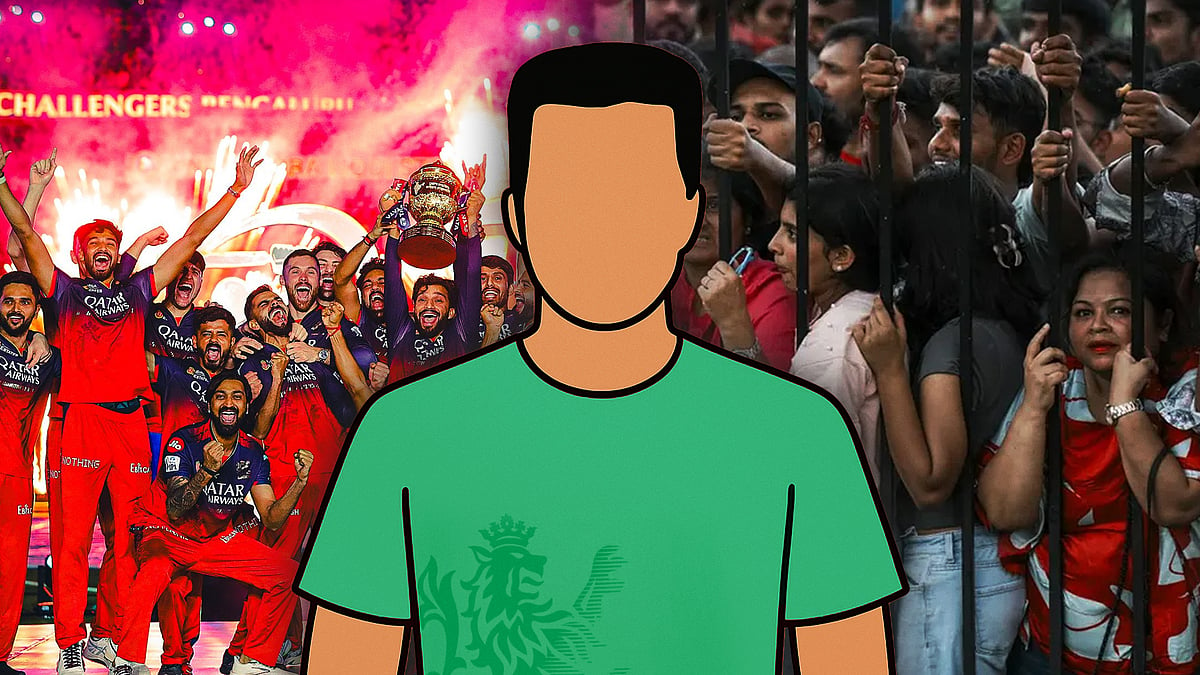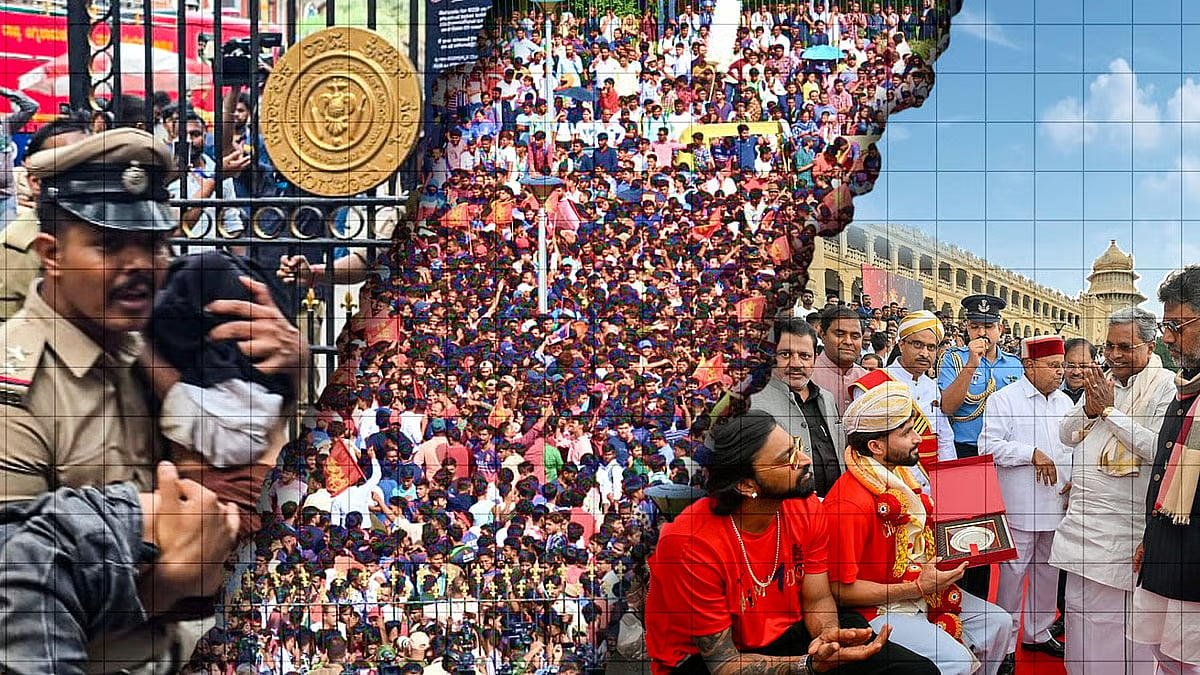Scapegoat vs systemic change: Why governments can’t just blame a top cop after a crisis
A public display of accountability is no substitute for the discomfort of systemic introspection.
Recently, the Bengaluru bench of the Central Administrative Tribunal quashed the suspension of an IPS officer following the RCB stampede. Police officers are only human, the tribunal said, and not “bhagwan”.
The tribunal’s decision can be contextualised as more than just a legal reversal for the state government. In some ways, it lays bare the shoddy side of what has now become a reflex move of governments while dealing with a public uproar over a crisis or tragedy.
Even if the Karnataka government appeals against the order, there’s little doubt to the subtext of what the tribunal said – that the populist scapegoating of police officials in the name of fixing accountability is the easy way out of public scrutiny. More often than not, such suspensions, or sometimes transfers, are aimed at political optics rather than addressing the specific reasons behind a crisis or incident.
Significantly, the tribunal’s order slammed the suspension order as “mechanical”, as there was an absence of convincing material to show the negligence of the police. In annulling the suspension of Inspector General Vikash Kumar Vikash, who had challenged his suspension, the order is in principle applicable to other officers who were suspended too: then Bengaluru Police Commissioner B Dayananda and his deputy Shekhar H Tekkannavar.
At the same time, the CAT was clear in questioning the RCB’s callousness in asking its supporters to gather in numbers that are hugely disproportionate to the Bengaluru stadium’s capacity – that too without the consent of the police. It gave little time to the police to respond to the swelling of the crowd that triggered the stampede, claiming 11 lives.
But such instances of textbook scapegoating are common in India, where the complexity of a multi-agency failure is reduced to the alleged (and hastily inferred) inaction of a single officer. It is lazy in terms of public reasoning as well as administratively damaging.
But the order also permits us to look at a less-scrutinised malaise of political practice in the country. It isn’t about the Bengaluru stampede alone. Its many versions can be frequently seen across cases, feeding into the pattern of populist governance overriding institutional judgement. Such misdirected punitive measures have insidiously crept into the governance culture over decades.
Across India, in the aftermath of public tragedies, governments often reach for the most visible and politically safe remedy: suspend or transfer an officer. Such actions offer immediate optics – a public display of accountability without the discomfort of systemic introspection.
When officers are penalised without being heard, when actions are taken before investigations are complete, and when governments confuse symbolism for substance, they undermine both governance credibility and institutional morale.
The short-term political objective, however, incurs its own latent costs. When officers are penalised without being heard, when actions are taken before investigations are complete, and when governments confuse symbolism for substance, they undermine both governance credibility and institutional morale.
As the law-enforcing wing of the state, a police force needs to have the confidence of the political executive and a degree of fair play in assessment of its work. But when such faith is replaced by the pull of performative reprimands, the fallout is a demoralised, risk-averse police system. In the process, this reinforces a response in which officers begin to prioritise covering their tracks over proactive action. The obvious casualty is that initiative is replaced with hesitation, especially in high-pressure situations that demand swift but bold responses.
It is nobody’s argument that holding police officers accountable, like other civil services personnel, is an integral democratic function. But the question is how, when and against whom it’s being directed, and whether the due process of law and as well as procedure established by law being followed in the process. Before they are reduced as pawns to assuage public outcry, these questions need to be addressed.
Significantly, over the last few decades, these questions have also surfaced in the review of the working of the police and the reforms proposed by various reports submitted by different bodies and observations made by the Supreme Court in a landmark case.
In the National Police Commission reports of a period as far back as 1979-81, it was noted that arbitrary suspensions, transfers, and disciplinary actions against police officers by political executives had become a tool of control, often used to divert blame or settle scores rather than on the basis of merit or due process. By the turn of century in 2000, the Padmanabhaiah Committee report was clear in warning against using police personnel as scapegoats during public or political crises, pointing to the “growing trend of sacrificing officers to satisfy public emotion” without fair investigation.
While mentioning the demoralising effect of this insidious trend on the police, the report batted for departmental inquiry before any action was taken against the officer, and not merely because of political pressure.
The issue resurfaced in the fifth report of the Second Administrative Reforms Commission, titled “Public Order” and submitted in 2007, as it flagged the unfair punishment of police officers through suspensions and ill-thought transfers which harm both governance and morale. A year earlier, in 2006, in the much talked about Prakash Singh v Union of India case, the Supreme Court was of the view that arbitrary suspensions and transfers were a key means of control over police, and that’s a scourge to be addressed. In the same case, the apex court issued a directive that states must set up a Police Establishment Board to manage transfers, postings and suspensions of officers up to rank of Deputy SP in a transparent manner, and without any political imprint.
Sometimes the wise and forthright police leadership can also make this point clear to the political class, particularly those part of the high offices of the executive. Abhayanand, former IPS officer who also served as DGP of Bihar, recalls one such episode in his autobiography Unbounded. He writes about how a timely intervention by a senior officer put the issue in perspective while the visiting union minister was looking for a quick fix to placate public outrage.
In 1980, after a massacre in rural Bihar triggered furore all over the country, the then union home minister Giani Zail Singh, who later became President of India, visited the place of occurrence, accompanied by top authorities and a battery of journalists. At one point, the home minister got ill-tempered and suggested that the SSP of the district be stripped of his uniform. Abhayanand recalls that LV Singh, then the DIG, raised a bold voice against this outburst. He said if stripping SSP of the uniform could save the situation, it must be done immediately.
Then, upon being asked by Zail Singh what would save the situation, the senior officer replied, “Prompt investigation and fast trial leading to conviction.”
This moment was etched in Abhayanand’s memory. He wrote, “We, young IPS officers who were still learning our ropes, had such leaders to show us the way.”
The centrality of accountability of the administration and the police isn’t in question in democratic governance. But that can’t sidestep the foundational principles of fairness, reasoned inquiry and proportionate response.
At the same time, it was also a reminder to the political class that real responses to such crises were not in the immediacy of targeting officials but in the patience of getting to the truth and letting the law punish the culprits.
The centrality of accountability of the administration and the police isn’t in question in democratic governance. But that can’t sidestep the foundational principles of fairness, reasoned inquiry and proportionate response. Time-bound investigations done in a transparent manner can be a way to build public confidence even in times when distrust of authority is fanned by different elements and general cynicism. Throwing officers under the bus for scoring immediate political points is surely a myopic response to larger questions of a crisis and its management.
The pull of performative reprimand and politicised reprisals have only gained more allure in times of round-the-clock news media glare and social media traction. But such optics which have become a reflex move of the political executive across the country severely dilute the cause of fairness and morale of the police force, as the CAT order against suspension of police officials in Bengaluru clearly shows. The textbook cases of scapegoating do little to fix accountability and pander more to the expedient script of political management.
Complaining about the media is easy. Why not do something to make it better? Click here to subscribe to Newslaundry.
 The story of a disaster: An IPL win, a city’s joy, and a tragedy that was waiting to happen
The story of a disaster: An IPL win, a city’s joy, and a tragedy that was waiting to happen Miscommunication, poor plan, social media frenzy: Piecing together the Bengaluru stampede
Miscommunication, poor plan, social media frenzy: Piecing together the Bengaluru stampede